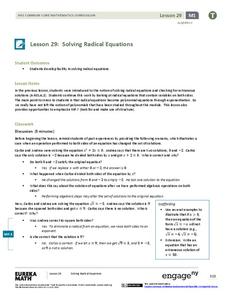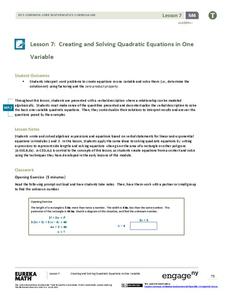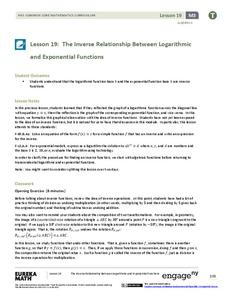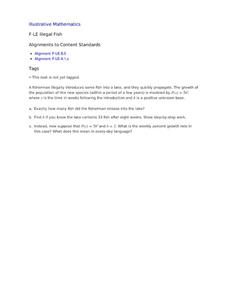EngageNY
Bacteria and Exponential Growth
It's scary how fast bacteria can grow — exponentially. Class members solve exponential equations, including those modeling bacteria and population growth. Lesson emphasizes numerical approaches rather than graphical or algebraic.
Curated OER
Bacteria Populations
Your young microbiologists will interpret and solve exponential equations in this real-world context task set in a hospital research scenario. Learners think in terms of the functions as well as their rates of change.
Curated OER
Solving Exponential Equations
Solving exponential and logarithmic equations is taught in this interactive lesson. Students use properties of logarithm and exponents solve functions. They estimate the solution and use the Ti to find the exact solution.
EngageNY
Solving Radical Equations
Learners solve complex radical equations. Solutions vary from one, two, and none, allowing pupils to gain experience solving a variety of problems.
EngageNY
Creating and Solving Quadratic Equations in One Variable
Give your classes practice at modeling using quadratic models with a resource that uses area and integer problems to allow individuals to create second degree polynomials. Young mathematicians solve equations using factoring and then...
Curated OER
Solving Logarithmic Equations
High schoolers solve logarithmic equations. They graph and plot logarithmic functions and use algebraic steps and the calculator to simplify and solve the equations.
Curated OER
Exploring Exponential Growth and Decay Functions
Learners differentiate between exponential growth and decay. In this algebra instructional activity, students solve exponential equations using properties of exponents. They use the Ti calculator to graph and analyze their...
Curated OER
In the Billions and Exponential Modeling
Modeling population growth gives learners an opportunity to experiment with real data. Comparing the growth rates in this real-life task strengthens learners' understanding that exponential functions change by equal factors over equal...
Curated OER
Newton's Law of Cooling
Your Algebra learners analyze and solve an exponential equation in this popular, real-life model of the cooling of a liquid.
EngageNY
The Inverse Relationship Between Logarithmic and Exponential Functions
Introducing inverse functions! The 20th installment of a 35-part lesson plan encourages scholars to learn the definition of inverse functions and how to find them. The lesson plan considers all types of functions, not just exponential...
Curated OER
Exponential Functions
Analyze functions by their shape and equation and identify decay and growth based on the equation given. Learners graph their exponential functions and differentiate it using the logarithmic versus the exponential function.
Curated OER
Doubling Your Money
Your young financial geniuses explore the Rule of 70 as they analyze the exponential function that models the doubling time of investments.
Curated OER
Rising Gas Prices – Compounding and Inflation
Financial literacy skills and exponential models are connected by the compound interest formula in this task centered on inflation calculations. Collaborative learners get experience collecting data from the given websites and exploring...
Curated OER
Comparing Exponentials
Growing money exponentially is the context of this scenario that asks learners to compare investments in two certificate of deposit accounts. Your young investment analysts will learn about the exponential characteristics of money...
Curated OER
Matchstick Math: Using Manipulatives to Model Linear, Quadratic, and Exponential Functions
Playing with matches (unlit, of course) becomes an engaging learning experience in this fun instructional unit. Teach pupils how to apply properties of exponential functions to solve problems. They differentiate between quadratic and...
Curated OER
Systems of Linear Equations
Introduce the inverse matrix method to solve systems of linear equations both algebraically and graphically. Using given data, your class checks their answers with graphing calculators. Handouts are included in this well-thought out lesson.
Curated OER
Exponential Growth versus Polynomial Growth
Your algebra learners explore the values of two types of functions in order to compare growth rates in this short cooperative task. Two types of solutions are given, using a table of values and an abstract argument.
Curated OER
Introduction to Solving Quadratic Equations by Factoring
Students solve quadratic equations. In this algebra lesson plan, students factor and graph linear and quadratic functions. They identify the standard and linear form of each equation.
Curated OER
Illegal Fish
Your young fishermen learn about exponential function growth by interpreting the pieces of the given equation within the context of numbers of fish in a lake.
Curated OER
Interesting Interest Rates
Your young bankers compare earning interest accumulated yearly and monthly to decide which method most increases their balance. Using an exponential function to model the bank balance affords the learners more practice connecting...
EngageNY
Modeling with Exponential Functions
These aren't models made of clay. Young mathematicians model given population data using exponential functions. They consider different models and choose the best one.
EngageNY
Properties of Logarithms
Log the resource on logarithms for future use. Learners review and explore properties of logarithms and solve base 10 exponential equations in the 12th installment of a 35-part module. An emphasis on theoretical definitions and...
Curated OER
Exponential Functions and the Natural Logarithm
Students solve exponential and log functions. In this algebra lesson, students graph natural log and logarithmic functions. They compare and contrast between logs and the exponential graphs.
Virginia Department of Education
Exponential Modeling
Investigate exponential growth and decay. A set of six activities has pupils collecting and researching data in a variety of situations involving exponential relationships. They model these situations with exponential functions and solve...























